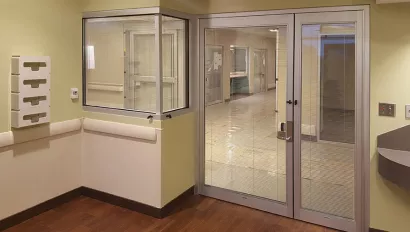According to the CDC, approximately 61 million individuals in the U.S are living with some form of a disability.1 That’s about 25% of the population, all of whom represent potential new employees and customers protected by the American Disabilities Act (ADA)2.
Signed into law in 1990 to protect the rights of the disabled, the ADA ensures that government entities and private businesses will make reasonable accommodations to provide disabled individuals with usable access to their facilities – including access to workspaces. It is perhaps one of the most important pieces of bipartisan legislation ever passed by the U.S. government.
Although passage of this legislation creates some financial burden for public and private organizations to make these improvements, the benefits are considerable. Here are just eight examples:
1. Builds goodwill and a positive reputation within the community
Businesses and organizations that demonstrate goodwill build upon their reputations within their local and professional communities. This holds especially true for privately held small and medium sized businesses open to the public. More than just a symbolic gesture, it encourages a large group of new customers to visit these establishments and expands the pool of potential employees to join the workforce. Showing that the organization cares about the needs of everyone also demonstrates a strong sense of character and social responsibility that transcends paid advertising.
2. Expands your appeal to a significant segment of the population
Showing a welcoming face to people with disabilities opens new pathways to a demographic which is well-accustomed to advocating for themselves. Providing unimpeded access to this audience will resonate quickly, and increase the public visibility and popularity of any organization.
3. Inclusivity makes for better business
When people feel good about their surroundings and peers, they help create a better environment for work, shopping and other activities. By providing facilities that demonstrate inclusivity to everyone who enters the premises, an organization can grow and expand in new and unique ways.
4. Levels the playing field
Facilities managed by larger corporations are invariably equipped with access for the disabled which makes them easier to use for anyone with mobility issues. Small and medium sized organizations that become ADA compliant can become more competitive while offering a better environment for customers and employees alike.
5. Provides a tax incentive
The federal government offers a tax credit for small businesses who make eligible ADA-related access expenditures. Download this fact sheet on ADA tax incentives here for more information.
6. Protects against legal action
Organizations that do not provide disabled individuals with appropriate access to facilities could be exposed to potential lawsuits. This threat can be averted by making sure everyone is welcome to shop, work, or receive services with ADA compliant entryways.
7. Accessibility makes life easier for everyone
There are many people who benefit from touchless automatic doors, including:
- People recovering from an injury
- Elderly individuals with mobility limitations
- Parents with strollers and small children
- Shoppers with their arms full of packages
Anyone who has ever fit into one of those categories and had a facility door open automatically for them understands what a relief it is. For a business, this is one of the fastest ways to make a good impression on clients.
8. It’s the right thing to do
At STANLEY Access Technologies, our highly experienced specialists assist our customers in finding the most easy and cost-effective ways to retrofit their facilities with ADA compliant entryways and provide access for everyone that minimize disruptions to business during installation. Click here for more information.
1. https://www.cdc.gov/ncbddd/disabilityandhealth/infographic-disability-im....
2. https://www.ada.gov/pubs/adastatute08.htm




